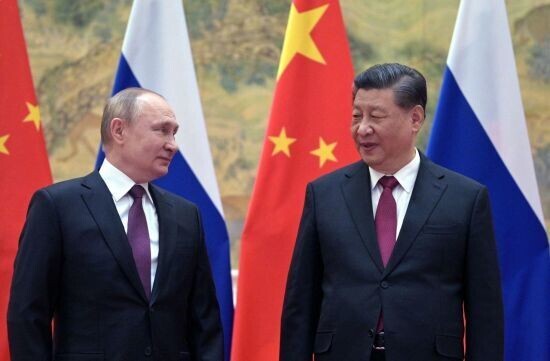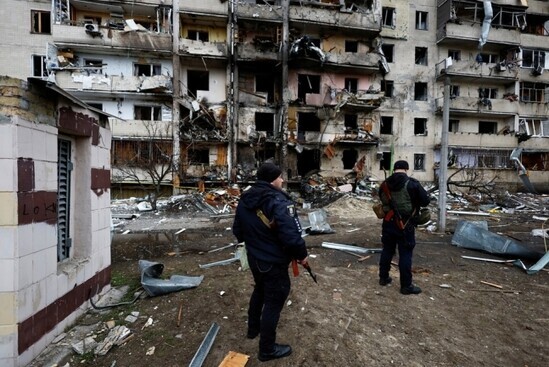hankyoreh
Links to other country sites 다른 나라 사이트 링크
Understanding China’s calculated stance on Russia’s invasion of Ukraine

After Russian President Vladimir Putin made the unexpected decision to invade Ukraine on Feb. 24, China’s next steps have naturally been a subject of keen interest around the world. The triangular relationship between the three great powers of the US, China and Russia has defined the world during the 70-plus years since the end of World War II.
Amid China’s fierce strategic competition with the US, will it side with Russia, condoning this overt act of aggression, or will it call for restraint in line with global trends? The answer to that question will surely have a decisive impact on the future of the world order.
While the conflict over Ukraine has now escalated into a full-blown war, China is exhibiting sympathy over Russia’s security concerns and underscoring the US’ culpability for the current situation.
On Feb. 23, the Chinese state-run Global Times quoted Wang Yi, the foreign minister of China and state councilor, saying, “The legitimate security concerns of any country must be respected.”
China appears to be pointing to how the US’ continued intensive blockade of Russia and NATO’s advances ever-more eastward meant Moscow had no choice but to address its security situation by intensifying military pressure on Ukraine. As such, according to China, the responsibility for this crisis lies with the US.
But that’s not all China is saying about the current situation. At every opportunity, China has made sure to mention the UN Charter which states that the sovereignty, independence and territorial integrity of all countries must be preserved and that “Ukraine cannot be an exception.” By doing so, China is both acknowledging Russia's security concerns and calling for Ukraine's sovereignty to be guaranteed — a dual position.
Western experts have interpreted China's position as equivocating, but in this uncertain and unclear situation, this was the best answer China could offer.
For years, China has used principles like respect for sovereignty and territorial integrity as trump cards whenever the West criticized China for human rights violations in Hong Kong or Xinjiang or when Beijing put military pressure on Taiwan.
While keeping in mind the importance of continued China-Russia cooperation against the US, it was an inevitable choice for China to maintain a consistent position on issues that directly affect China’s core interests.

However, since the start of the war in Ukraine, China's position has changed subtly. At the Sino-Russian summit held on Friday afternoon, Chinese President Xi Jinping said, “It is important to reject Cold War mentality, take seriously and respect the reasonable security concerns of all countries and reach a balanced, effective and sustainable European security mechanism through negotiation.”
“China supports Russia in resolving the issue through negotiation with Ukraine,” Xi added.
In other words, Xi expressed his subtle opposition to Russia's use of force by conveying the need for talks. Chinese Foreign Ministry spokesperson Hua Chunying also emphasized that “China’s position on the Ukraine issue is consistent and stays unchanged."
If we sum up the attitudes that China has shown thus far, it seems that although China is siding with Russia, Beijing will also maintain its line against extreme actions such as the use of force.
While Western media and experts are calling the crisis in Ukraine the “coming of a new Cold War” and are quick to assume the worst, Beijing sees the situation as simply a regional conflict and continues to call for all sides to abandon what it calls the “Cold War mentality.”
On Friday, China abstained from voting on the UN Security Council resolution condemning the invasion of Ukraine, but did not vote against it. Similarly, China did not approve the Russian annexation of Crimea in March 2014 and maintained some distance from the situation.
Chinese experts also argue that a cautious approach is necessary.
Huiyao Wang, president of the Center for China and Globalization think tank in Beijing says, “China still needs to maintain relations with the US,” adding that “China should pursue equidistant diplomacy between the US and Russia for the time being.”
What these experts are saying is that China, which is in a difficult and ongoing confrontation with the US in the fields of economy, defense and foreign affairs, should not get itself involved in another conflict — especially one that doesn’t directly concern it.
Moreover, unlike with the US, China is making efforts to improve relations with Europe, believing that it is possible to maintain friendly relations. In particular, China maintained a friendly relationship with Germany, during the time of Chancellor Angela Merkel, and is also trying to maintain communications with Germany’s current coalition government led by the Social Democratic Party.
Historically, since the founding of the People’s Republic of China in 1949, China has taken a wait-and-see attitude without directly participating in other countries’ wars — the one exception being the Korean War from 1950 to 1953.
Although China does respond strongly to issues related to Taiwan and other territories it considers to be “core interests,” Beijing has maintained a Chinese-style isolationist position regarding wars in other countries, arguing that such conflicts should be resolved by those countries themselves.
For example, when US troops withdrew from Afghanistan in August last year, both China’s Xi Jinping and Russia’s Vladimir Putin expressed their opposition to interference in Afghanistan's internal affairs.
Still, according to the West, a continuation in the strengthening of cooperation between China and Russia is inevitable. In the case of Russia's annexation of Crimea, China signed a contract to receive natural gas from Russia worth US$400 billion, offsetting the effects of Western economic sanctions.
Xi and Putin also met before the opening ceremony of the Beijing Winter Olympics on Feb. 4, where they announced that they had signed a long-term contract to significantly increase the natural gas supply from Russia to China.
Above all, the two countries share the strategic goal of transforming the American-style liberal international order, which has continued for more than 30 years since the Cold War, into a multipolar system in which they play an important role.
On the one hand, China is dreaming of a “great rejuvenation of the Chinese nation” while Russia is dreaming of a “revival of the great Russian empire.”
But there are also many elements of conflict between the two major countries. As the major powers capping the eastern and western ends of Eurasia, there has been a long history of conflict along the thousands of kilometers-long borders spanning the continent.
The territorial dispute between the two countries was resolved in the 2000s, but China's entry into Central Asia — former Soviet territory — due to its Belt and Road Initiative, could be leading to a silent power struggle in the region.
Although Russia and China are strengthening their cooperation against their common enemy in the US, their relationship is not one of true and full trust like that of inseparable allies.
By Choi Hyun-june, Beijing correspondent
Please direct questions or comments to [english@hani.co.kr]

Editorial・opinion
![[Guest essay] The real reason Korea’s new right wants to dub Rhee a founding father [Guest essay] The real reason Korea’s new right wants to dub Rhee a founding father](https://flexible.img.hani.co.kr/flexible/normal/500/300/imgdb/original/2024/0423/8317138574257878.jpg) [Guest essay] The real reason Korea’s new right wants to dub Rhee a founding father
[Guest essay] The real reason Korea’s new right wants to dub Rhee a founding father![[Column] ‘Choson’: Is it time we start referring to N. Korea in its own terms? [Column] ‘Choson’: Is it time we start referring to N. Korea in its own terms?](https://flexible.img.hani.co.kr/flexible/normal/500/300/imgdb/original/2024/0423/3617138579390322.jpg) [Column] ‘Choson’: Is it time we start referring to N. Korea in its own terms?
[Column] ‘Choson’: Is it time we start referring to N. Korea in its own terms?- [Editorial] Japan’s rewriting of history with Korea has gone too far
- [Column] The president’s questionable capacity for dialogue
- [Column] Are chaebol firms just pizza pies for families to divvy up as they please?
- [Column] Has Korea, too, crossed the Rubicon on China?
- [Correspondent’s column] In Japan’s alliance with US, echoes of its past alliances with UK
- [Editorial] Does Yoon think the Korean public is wrong?
- [Editorial] As it bolsters its alliance with US, Japan must be accountable for past
- [Guest essay] Amending the Constitution is Yoon’s key to leaving office in public’s good graces
Most viewed articles
- 1[Editorial] Japan’s rewriting of history with Korea has gone too far
- 2Samsung barricades office as unionized workers strike for better conditions
- 3[Column] ‘Choson’: Is it time we start referring to N. Korea in its own terms?
- 4Why Korea shouldn’t welcome Japan’s newly beefed up defense cooperation with US
- 5[Column] The clock is ticking for Korea’s first lady
- 6[Guest essay] The real reason Korea’s new right wants to dub Rhee a founding father
- 7Korean government’s compromise plan for medical reform swiftly rejected by doctors
- 8[Reporter’s notebook] Did playing favorites with US, Japan fail to earn Yoon a G7 summit invite?
- 9[Column] The president’s questionable capacity for dialogue
- 10Senior doctors cut hours, prepare to resign as government refuses to scrap medical reform plan